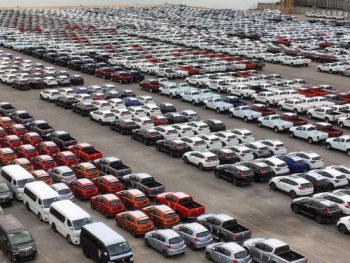The UK light commercial vehicle market fell by 24.6% last month, although battery electric vehicle (BEV) uptake continued to grow.

The new figures from the Society of Motor Manufacturers and Traders (SMMT) show a total of 15,520 units were registered in August, which is traditionally one of the quietest months of the year ahead of the September plate change.
It’s the lowest recorded volume for the month since 2017 and means that LCV registrations have declined every month of 2022.
The scale of the decline is artificially inflated in comparison with last year, when the sector saw its second-best August, recording a 21.1% rise compared to the pre-pandemic five year average.
But the SMMT also noted that it was the result of global supply chain challenges that had “acted as a handbrake on registrations”. It also said the growing economic headwinds were a concern too.
While every LCV class recorded a decline, performance varied significantly between the vehicle segments.
The biggest decline was recorded in pick-ups, which saw registrations fall by 52.2%, while 4x4s, the smallest segment by volume, declined by 49.7%.
Vans weighing more than 2.0 tonnes to 2.5 tonnes were down 45.3%; and those equal to or less than 2.0 tonnes fell 44.1%. The smallest decline was in registrations of vans weighing more than 2.5 tonnes, which dropped by 14.0%.
Battery electric vehicle (BEV) registrations however soared; rising by 14.7% to reach a 6.1% market share (from 4.0% a year ago). Year to date, BEV volumes are up 50.6%.
All eyes are now on the ‘new plate month’ in September, which the SMMT says will be crucial for the industry struggling to repeat the success it saw in 2021.
Year-to-date LCV registrations are down 24.2% on 2021 and 27.2% on pre-pandemic 2019.
Mike Hawes, chief executive, said: “Last year’s bumper LCV market meant it was always going to be challenging to repeat that success in 2022, and increasingly strong economic headwinds and supply chain challenges continue to test the market.
“Good progress is being made in the transition to electric, but accelerating the switch will need action from the new Prime Minister to tackle energy costs and inflation, while also encouraging greater charging infrastructure rollout, so that businesses can have greater confidence to upgrade their van fleets to cleanest, greenest models.”
Commenting on the figures, Sue Robinson, chief executive of the national franchised dealers’ association, said: “LCV buyers are driven by costs and viability, particularly business owners, with current government grants not yet compensating the price variation between fossil fuel and EVs to support the transition. It is therefore encouraging to see that BEV sales are continuing to grow, which is testament to consumers’ appetite for a more sustainable and environmentally friendly alternative to commercials.”

